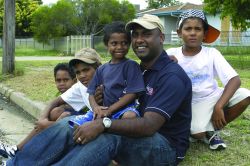Army puts reconciliation plan into action

Indigenous ministries is a calling close to Adrian Kistan's heart, which has led him to co-ordinating the rollout of The Salvation Army's Reconciliation Action Plan (Photo courtesy of Adrian Kistan).
The Reconciliation Action Plan (RAP) currently being developed by The Salvation Army is not just a government initiative or even doing “the right thing” by our Indigenous people – it’s about our faith and living the word of God, explains Adrian Kistan.
Adrian, former Territorial Indigenous Ministries Co-ordinator, has been contracted by the Australia Eastern Territory to lead the development of the RAP. His role will focus on both facilitating and engaging The Salvation Army towards a deeper understanding of reconciliation and development.
A RAP plan outlines the vision of organisations for reconciliation through meaningful, yet practical actions to develop stronger relationships, and enhanced respect between Aboriginal and Torres Strait Islander peoples and other Australians, as well as their aspirational plans to drive greater equality by pursuing sustainable opportunities.
“Put simply, the RAP program is about working with organisations across Australia to turn their good intentions into real actions,” says Reconciliation Australia, who assists organisations as they formulate their plans.
The Salvation Army National Indigenous Reference Group has made six key recommendations to the leadership of both Australian territories with regard to Indigenous Ministries.
“One of these recommendations was for The Salvation Army to develop a Reconciliation Action Plan,” Adrian explains.
“There are a number of corporations, organisations and companies that have already developed RAPs, such as Westpac, Woolworths, IBM and Mission Australia, with some churches joining this group.
“We all understand the disparity and disadvantage between Aboriginal and non-Aboriginal peoples, and the RAP puts some structure around what we’re doing to close the gap. It outlines how we can put good intentions into action to bring about unity, prosperity and equity for all Australians.”
The RAP focuses on three key areas – relationships, respect, and opportunities:
- Good relationships are based on trust, understanding, communication and mutual respect.
- Respect means to show pride in the cultures that have existed in this country for tens of thousands of years and in the contribution of Aboriginal and Torres Strait Islander people to Australia’s development.
- Opportunities are about creating avenues that will achieve equality in life expectancy, education, employment and all the important measurable areas of disadvantage.
“We, as The Salvation Army, affirm all those key areas and our history, our story, shows we have had some engagement in this,” says Adrian.
“We want to build on this and the RAP is the driver to push us towards these areas so we create new chapters of our story. We have the introduction and first few chapters but we need to complete the story.”
The driving force behind the RAP is 2 Corinthians 5:18. “Christ has reconciled us to and in turn given us the ministry of reconciliation,” says Adrian.
“This is our foundation, our heart. It’s about our faith and what we’ve been called to be.
“That’s what makes our RAP unique – it resonates with the heart of God, we are following principles based in the Gospel and reflecting God’s heart for reconciliation.”
Territorial Commander, Commissioner James Condon, is enthusiastically supportive of the RAP, both as leader of the territory, and personally.
Adrian is also engaging with divisional leadership and developing strategies for communicating with breadth of The Salvation Army through all its expressions in developing a Salvation Army RAP.
“It’s a period of wide and open engagement to promote our message to the wider Army, to give people input into the plan, and garner engagement across our movement,” he says.
After the engagement process, a working group will draft a RAP which will then go to Reconciliation Australia for endorsement.
The territory is hoping to launch its RAP plan in the first quarter of 2015.
If you have any questions, comments, suggestions or feedback, please contact Adrian at adrian.kistan@aue.salvationarmy.org
Comments
good stuff